From November 28 to 29, 2020, the 2020 Annual Meeting of the World Association for Chinese Studies (WACS) of China Comparative Literature Association ( CCLA) was held in chengdu, sichuan. It was hosted by the World Association for Chinese Studies of China Comparative Literature Association, undertook by School of Foreign Languages, Southwest Jiaotong University, and co-organized by International Sinology. More than 130 experts, scholars and student representatives from different universities and R&D institutions in China attended the event.
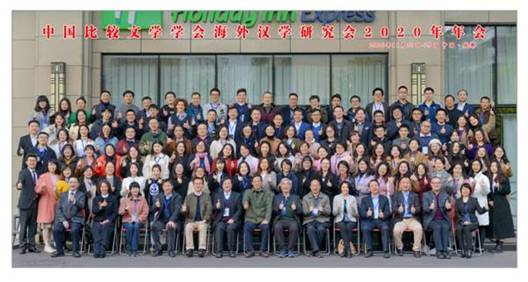
The opening ceremony of the annual meeting was held in the No. 3 conference room at Huanhuaxi Holiday Inn at 8:30 a.m. on 28. Yang Anwen, vice dean of School of Foreign Languages, Southwest Jiaotong University, presided at the opening ceremony. Yang first introduced the guests attending this annual meeting. They are: Zhang Xiping, president of World Association for Chinese Studies of China Comparative Literature Association, distinguished professor of Beijing Language and Culture University and professor of Beijing Foreign Studies University; Li Zhengshuan, member of the English Teaching Sub-committee of the Foreign Language and Literature Teaching Steering Committee of the Ministry of Education, and professor of Hebei Normal University; Zhang Bing, professor of Peking University; Wen Jun, professor of Beijing University of Aeronautics and Astronautics; Xu Baofeng, professor of Beijing Language and Culture University;Ge Guilu, professor of Fujian Normal University; Wu Yuanyuan, professor of East China Normal University; Shi Ye, professor of Shanghai Normal University; Chen Jianming, professor of Sichuan University; Ji Jin, professor of Suzhou University; Zhao Changjiang, professor of Xizang Minzu University; Yang Huiling, secretary general of World Association for Chinese Studies, and professor of Beijing Foreign Studies University; Long Yufei, deputy secretary general of World Association for Chinese Studies and professor of Northeast Petroleum University; Guo Jinghong, deputy secretary general of World Association for Chinese Studies and Associate Professor of Beijing Foreign Studies University; Professor Ren Xiaofei, dean of School of Literature, Jiangsu University; and professor Yu Xiayun from School of Humanities, Southwest Jiaotong University also attended the annual meeting. As the host of this annual meeting, Gui Fuqiang, deputy secretary of CPC in Southwest Jiaotong University, on behalf of the Southwest Jiaotong University attended the opening ceremony. Li Zhuohui, secretary of the Party committee of School of Foreign Languages in Southwest Jiaotong University, deputy secretary Wu Jun. In addition, three vice deans of School of Foreign Languages: professor Yu Senlin, professor Wang Pengfei and associate professor Yang Anwen and associate professor Ren Xiankai, assistant of dean opening ceremony also attended the conference.
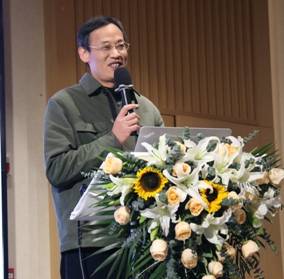
(Secretary Gui was giving his speech.)
In Secretary Gui’s opening speech, on behalf of the university, he first extended a warm welcome to all the experts and scholars coming from afar. Secretary Gui briefly introduced the history of Southwest Jiaotong University and the development idea of "excellent liberal and new arts". He pointed out that the study of Chinese and foreign comparative literature and overseas Sinology focuses on the cultural and academic exchanges and combination between China and foreign countries. At the very beginning of its establishment, Southwest Jiaotong University showed the characteristics of combining Chinese and western academic disciplines. The school's scholars' original intention of saving our country through science and education, their open and broad vision, their pursuit of first-class academic spirit and their integration with China and the world also echo the theme and research field of this annual conference.
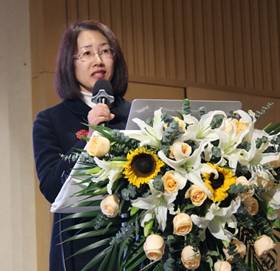
(Secretary Li was giving her speech.)
On behalf of the School of Foreign Languages, Li Zhuohui, Secretary of the Party Committee of School of Foreign Languages of Southwest Jiaotong University, extended a warm welcome and heartfelt thanks to all the leaders, experts and scholars who came to this meeting. She introduced to the guests the multilingual overseas Sinology studies of the School of Foreign Languages in the field of Confucian and Taoist classics and overseas Redology. She hopes that through this grand gathering, the school will improve the level of overseas Sinology research and talent cultivation, deepen the friendship with peers at home and abroad, and achieve a double harvest in both academic and friendship.
On behalf of the World Association for Chinese Studies of China Comparative Literature Association, editorial department of International Sinology and all the members attending the conference, professor Zhang Xiping would like to express his heartfelt thanks to the conference group and conference organizer of School of Foreign Languages, Southwest Jiaotong University. Professor Zhang affectionately reviewed the establishment of the association and all previous annual meetings. He especially emphasized that the most important reason why this annual meeting was held by School of Foreign Languages, Southwest Jiaotong University of chengdu was that, among all the foreign language colleges and universities in our country, School of Foreign Languages in SWJTU was the first to carry out overseas Sinology research and achieved remarkable results. The choice of SWJTU was a tribute to the school's decade-long commitment to overseas Sinology.
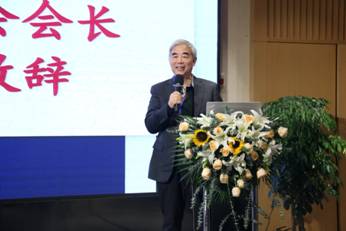
(President Zhang Xiping was speaking.)
Professor Zhang quoted sentences from Liang Qichao: when talking about Chinese academic research, there are three ways: to study China in China, to study China in Asia, and to study China in the world. The Chinese civilization not only promoted the East Asian civilization in East Asia, but also spread to Europe 400 years ago. Chinese civilization is a world civilization, especially when China is now at the center of the world, it is more necessary to explain the legitimacy of Chinese civilization, the importance of Chinese knowledge, and the global significance of Chinese culture. Therefore, we must carry out the study of Chinese culture in the world, which is the significance of overseas Sinology. Overseas Sinology studies in the academic area of China have only been around for 40 years, but it is an interdisciplinary, cross-linguistic, transnational and cross-lingual research field with broad academic prospects. This annual meeting will certainly promote the development of this discipline. President Zhang believed that with the joint efforts of all scholars, overseas Sinology research will have a bright future.
After his speech, on behalf of the World Association for Chinese Studies of China Comparative Literature Association, professor Zhang presented books to the School of Foreign Languages of Southwest Jiaotong University. Professor Yu, vice dean of the school accepted the gift on the stage. The books presented by Professor Zhang are divided into two parts, one is the International Sinology published in 2019 and 2020, and the other is“the Study Series on the Overseas Dissemination of Chinese Ancient Cultural Classics in the 20th Century” published by Elephant Publishing House, with a total of 20 kinds of books. This series of books was the research result of major projects of the Ministry of Education presided over by Professor Zhang, which took a total of 9 years to complete. They covers 27 languages and 43 countries. This compilation involves Sinological literature written in Oriental languages such as Japanese and Chinese, 10 languages in Southeast Asia and 10 languages in Eastern Europe for the first time in the world, which has very important literature value and academic contribution.
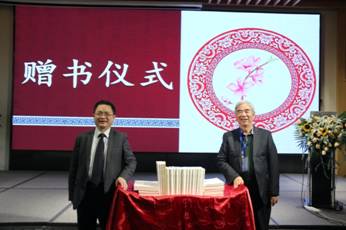
(The Book Donation Ceremony)
At 9:30 am, the first special reports were presided by Vice Professor Yang Anwen with speakers Professor Zhang Xiping from Beijing Foreign Studies University, and Professor Shi Ye from Shanghai Normal University.
With the theme" Review and Outlook of the Overseas Sinology Studies 40 Years After 'Reform and Opening up'", Professor Zhang made comprehensive review of the tremendous achievements made by the Chinese scholars in Overseas Sinology during the period from three aspects, including the founding of overseas Sinology Studies institutions, the development of its academic journals, and the translation and publication of sinological works. Based on his speech, Professor Zhang teased the present progress in Chinese academic society from overall research, history of missionary Sinology, history of Sinology by nationality, and history of Sinology by Subject. He contended, Overseas Sinology, the inter-discipline, cross-culture, cross-nation research area, would bring Overseas Sinology Studies variety and richness with its fusion and crossing of boundaries. Consequently, Professor Zhang shared his sincere expectations for the Overseas Sinology of Chinese academic society.Firstly, we ought to spare no efforts to translate and arrange the classical works of Overseas Sinology, especially the Overseas Sinology Studies translation of classics in non-English-spoken countries.To this end, our scholars should acquire multilingual abilities, maintain pure and stalwart mind, and pay generations of efforts, translating worldwide sinological classic works into Chinese and getting these translation published.Secondly, we should realize the important status of Overseas Sinology in the reconstruction precess of Chinese modern knowledge and culture to internally infuse the history and knowledge, thoughts and achievements, problems and flaws of Overseas Sinology Studies into the research of Chinese literature, history, philosophy. Thirdly, we, the scholars engaged in the outward -spreading research of Chinese culture and research of Overseas Sinology history, needed to go beyond the sheer research of translation, spreading and Sinology history and actively go back to the local academic stance, enhance local academic knowledge and thinking abilities, involved in the reconstruction of ongoing and contemporary Chinese academy.Finally,Professor Zhang concluded that cultural self-consciousness and academic self-consciousness were the basis for us to carry out the research of Chinese culture as well as the Western Sinology history;Open and inclusiveness spirit were our basic cultural attitude toward Overseas Sinologist;The critical spirit of being realistic and practical was our basic academic stance to inspect Western Sinology.Overseas Sinology studies in Chinese academic society will flourish to a more splendid scene on the abovementioned basis.
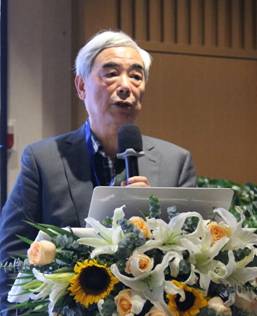
(President Zhang Xiping was speaking.)
Professor Shi Ye gave an address named "‘The Iron Crown’ and ‘Chong Zhen years’: The 17th century Writing in Ming and Qing Dynasties of Chinese and western dramas". "The Iron Crown" was the renowned drama script in early Qing Dynasty by anonym while "Chong Zhen years or The Collapse of The Ming Dynasty" was the drama by Joost·van den ,a Holland poet and dramatist. The two dramas were of the same materials from late Ming and early Qing Dynasty with similar plot-setting, diety connotation, and poetic drama quality. From the difference between Chinese and western view of drama and aesthetic idea, Professor Shi compared the discrepancy in above two dramas from the perspective of establishing creative tenet, structuring the drama, and showing displacement.She argued, "Chong Zhen years" was the first European literary work with "Chinoiserie", arousing the appearance of many a narrations during late Ming and early Qing Dynasty period, reflecting the impact for the western with the political event in the era, and a reflection of Europeans' curiosity to China since the Navigation Time as well as the cultural exchange trend between China and the western.
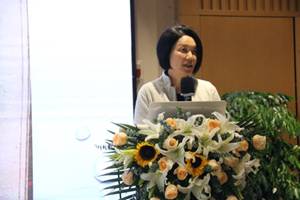
(Professor Shi Ye was speaking.)
The second special reports of the annual meeting began after a break, presided by Professor Yu Xiayun from Southwest Jiaotong University, School of Humanities with three distinguished guests who delivered their speeches.
Professor Wen Jun from BEIHANG University gave a speech"Research on the Operation Mechanism of Translation Strategy System of Ancient Chinese Poems into English".Professor Wen ,combining qualitative analysis with quantitative analysis, made an empirical analysis of the translation strategies of ancient Chinese poetry in terms of language, form and content, based on self-built corpus of poetry translations and e-c parallel corpus .Consequently, we can observe and study the associated operation between translation strategy levels and the relevance of the operation mechanism of the Strategy system for the translation of ancient Chinese poems into English.He elaborated concrete translation examples in speech and showed the regular associated operation mode between the language simplification, the form diversification, the strategies of word shifts and the extension of translation to demonstrate the interplay between foreign language factors, such as poetics, diachronic context and translator, and language.
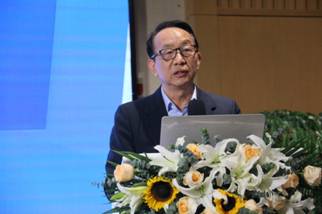
(Professor Wen Jun was speaking.)
Professor Zhang Bing from Peking University had the theme- speech"The Dissemination of Chinese classics from' Chinese Knowledge Spreading into the West' to' Western Learning Spreading Russiaward' — with early spreading of "The Great Learning" in Russia. He presented the translation process and the specific translation of "The Great Learning" in Russia-speaking countries during his speech with the earliest Latin version into Russia.In 18th century Age of Enlightenment, the Ruussian version of "The Great Learning" was from the French.It was clear to observe the "Western Learning Spreading Russiaward" tendency from the modern Russian academic history. Professor Zhang also suggested, most Russian works related to Chinese ideas and philosophy were translated from European languages from 1730 to 1930.The unique way to introduce Chinese classics to Russia presented the differentiated development of Russian Sinology.On the one hand, it exerted huge impact on the development of Enlightenment in Russia and the shaping of social ideology at that time as well as the construction of Russians' China outlook in the 18th century.On the other hand, it showed the close relation between the traditional Chinese classics, its influence in Russia and the development of European history and social tide.
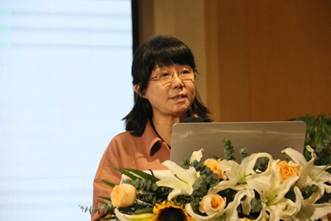
(Professor Zhang Bing was speaking.)
Professor Ji jin from Suzhou University completed a speech at "Doctoral Dissertation of Xia Zhiqing and the other". Xia Zhiqing graduated from Yale University in 1951 with a
doctoral degree, a dissertation named "George Crabber A Critical Study." Xia's dissertation, however, had barely been mentioned ever since.Professor Ji retrieved the dissertation from the Yale University Library and rearranged its content and logic, blueprinting Chin Tsing Hsia's academic presence as expert in English poetry. Professor Ji pointed out, in order to figure out which aspect affected Xia Zhiqing's research on Chinese literature against his rich academic background of "New Criticism" theoretical stance, interpretive context of world literature and profound Humanism spirit, we should thoroughly explain the literary view, aesthetic view, humanistic view and critical view in his dissertation. Thus, we can make in-depth commentary on Xia Zhiqing's stance and interest, significance and value in the study of Chinese literature.
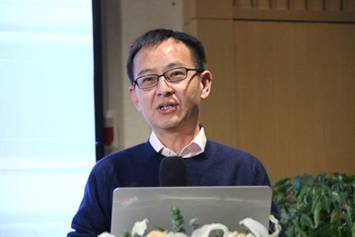
(Professor Ji Jin was speaking.)
The reporting session of the sub-forum of this annual meeting is held from 2 to 6 p.m. on Nov 28th. Respectively focusing on the overseas translation and research of Chinese classics, the study of missionary Sinology studies, the study of Chinese image from the perspective of international sinology studies, the study of sinologists, and the study of national sinology (including Germany, Canada, the United Kingdom, Mexico, Japan, and Korea) and other topics, the 10 sub-forums were held successfully. Representatives in each sub-forum carefully completed their academic presentations and the reviewers conducted targeted academic comments in strict accordance with the requirements of the annual meeting. With all the participants actively engaged, many sub-forums did not conclude all discussions and exchanges until after 6 p.m.
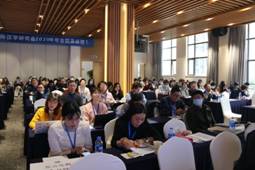

(The venue of the annual meeting)
Started at 8 a.m. on Nov 29th, the third keynote report was presided over by associate professor Ren Xiankai, dean assistant of the School of Foreign Languages in Southwest Jiaotong university.
The first speaker was Professor Wu Yuanyuan from East China Normal University. Entitled "Reflections on the Academic History of Overseas Sinology Studies-Taking American Sinology Studies as an Example", his speech reflected on the current situation of overseas Sinology studies, and put forward two ways of carrying out overseas Sinology studies with academic history as the foundation, one is to figure out the evolution history of Sinology studies in a particular country or region from the perspective of the evolution of academic development, and the other is to clarify the exchange and interaction between domestic and foreign sinology studies from the perspective of Sino-foreign cultural exchanges. Professor Wu's speech stood high and pointed out the direction for constructing a well-structured overseas Sinology studies system and deepening the understanding of the value of interactive exchanges between Chinese and foreign academic institutions.
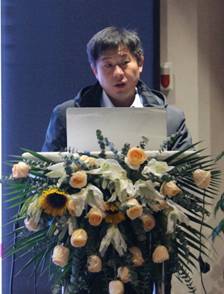
(Professor Wu Yuanyuan was speaking.)
Professor Xu Baofeng from Beijing Language and Culture University, addressed a speech on the topic of " China-centered Approach in the Study of Sinology Studies along the Belt and Road". Professor Xu presented his thoughts on the perspective and standpoint of the Sinology studies and pointed out that the study of China must be conducted from China's own perspective, and must take full account of the realities of what is happening and what have happened in China's academic, political, economic, historical and cultural field. Based on this understanding, the establishment of the China-centered approach in the Study of Sinology Studies along the Belt and Road is not only a significant strategy to reject Western centralism, but also a practical measure to establish a new order for the world culture.
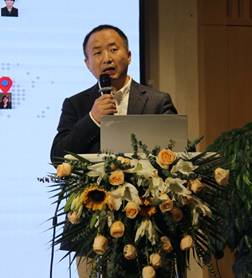
(Professor Xu Baofeng was speaking.)
Professor Ge Guilu from Fujian Normal University, gave a speech entitled "Overseas Sinology Studies: Documentation, Problem Orientation and Discourse Construction". Combing through the relationship between overseas Sinology studies, comparative literature studies and translation studies, Professor Ge concluded that the effective path of developing overseas Sinology studies lies in the cross-cultural studies which combined philology with comparative literature. He also emphasized that the expanding and deepening of overseas Sinology studies depends not only on the promotion of the exchange of academic and cultural ideas between China and foreign countries, but also on the development of local culture and academic research.
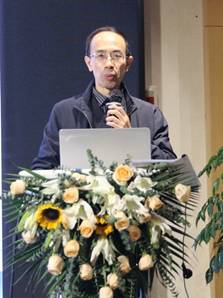
(Professor Ge Guilu was speaking.)
Professor Chen Jianming from Sichuan University delivered a speech entitled "On the Traditional Chinese Religious Studies Paradigm and Its Shift of Western Sinology Studies". Starting with Thomas Kuhn's concept of "paradigm", Professor Chen elaborated the evolution of three different research paradigms of Chinese religious studies in the traditional western Sinology studies. He argued that reflecting on the traditional Chinese religious research paradigm of Western Sinology studies will help us to establish religious studies schools with Chinese characteristics and Chinese discourse power.
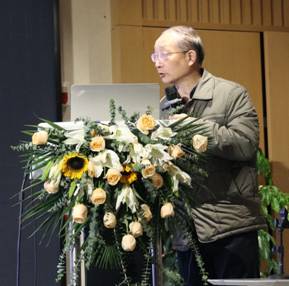
(Professor Chen Jianming was speaking.)
After the tea break, the annual meeting entered its fourth and final keynote address. Presided over by Professor Wang Pengfei, vice dean of the School of Foreign Languages in Southwest Jiaotong University, the keynote speech was delivered by three guests.
The first speaker was Professor Li Zhengshuan from Hebei Normal University, who has written a lot in the fields of Anglo-American poetry studies and Chinese-English poetry translation, and is also the English translator of Sakya Lekshe. His speech was entitled "The English Translation of Sakya Lekshe and Its Characteristics". In his speech, Professor Li gave a detailed account of the translation and publication of Sakya Lekshe at home and abroad, and presented his own translation, sharing his experience in the translation and study of the Tibetan motto. His translation practice and research works have made great contributions to the overseas propagation of Chinese national literature.
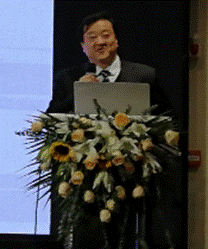
(Professor Li Zhengshuan was speaking.)
Professor Zhao Changjiang from Tibetan University for Nationalities delivered a speech entitled “Study on the History of the English Translation of Dream of Red Mansions: Constructing and Discovery”. Professor Zhao first introduced the focus of the academic conference to the young scholars, and shared his experience in finding academic topics and constructing research ideas. After that, Professor Zhao elaborated four clues in the English translation history of Dream of Red Mansions, and focused the discussion on the textual level of the target text. Through this kind of research, he gave an in-depth analysis of the cultural exchange consciousness that shows in the English translation of Dream of Red Mansions, and "Chineseization" translation, "transparent" translation, and the de-conceptualized translation history.
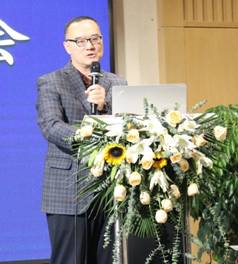
(Professor Zhao Changjiang was speaking.)
The last speaker was Professor Yu Senlin from Southwest Jiaotong university, also the host of the annual meeting. Professor Yu's speech was entitled “Overseas Taoism Studies: History, Present situation and the Future”. Professor Yu reviewed the historical context, current situation and existing problems of Taoism studies at home and abroad, and put forward the future expectations of overseas Taoism studies. In his speech, Professor Yu showed a series of achievements made in recent years by the oversea Taoism research team of the School of Foreign Languages in Southwest Jiaotong University. And his future expectations that overseas Taoism studies “still has a large room for further development and a long way to go” drew a successful conclusion to all the speeches of this meeting.
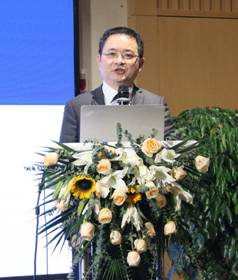
(Professor Yu Senlin was speaking.)
After all the keynote presentations have been completed, the meeting moved on to the sub-forum summary session. Each sub-forum moderator reported on the attendance, content and exchange of results of the sub-forum for which he or she was responsible.
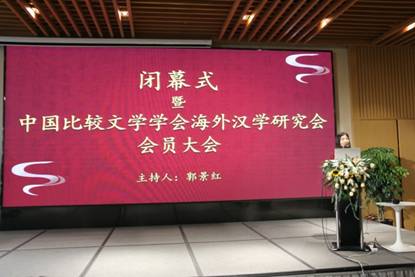
(Closing Ceremony and General Meeting of World Association for Chinese Studies of China Comparative Literature Association )
At the closing ceremony and the general meeting of the World Association for Chinese Studies of China Comparative Literature Association, professor Guo Jinghong, deputy secretary-general of the World Association for Chinese Studies, presided over the meeting while the host of the Annual Meeting, the vice dean Professor Yu, made a concluding speech. Firstly, he thanked the Overseas Sinology Studies Association for its trust and support to the School of Foreign Languages of Southwest Jiaotong University, and expressed his sincere thanks to all the members of the Committee for their hard work and the active participation of all the delegates. Then Professor Long Yufei, deputy secretary-general of the World Association for Chinese Studies, read out the resolution of the Council of the Association, including new directors, new members and other related issues. After that, President Zhang Xiping made a relevant explanation on the translation project of overseas Sinology studies, introduced the support from Elephant Press and Guangxi Normal University Press for the translation of overseas Sinology studies, and welcomed scholars to supplement the publication of the book list. Subsequently, Zhang Qianjing, deputy editor of Elephant Press, and Zhang Jie from Guangxi Normal University Press, spoke separately, expressing their strong support to the publishing work of World Association for Chinese Studies and sinology researchers at home and abroad.
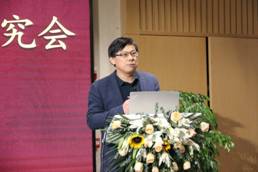
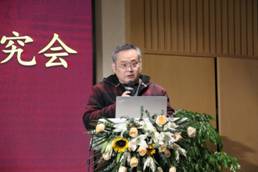
(Deputy editor of Elephant Press Zhang Qianjing was speaking.)
(Zhang Jie from Guangxi Normal University Press was speaking.)
In the end, Professor Ren Xiaofei, dean of School of Liberal Arts in Jiangsu University and also the host of the 2021 Annual Meeting of the World Association for Chinese Studies, spoke on behalf of the organizers of the next annual meeting and warmly welcomed everyone to come together again in Zhenjiang, Jiangsu Province in 2021.
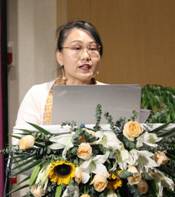
(Dean of School of Liberal Arts of Jiangsu University Ren Xiaofei was speaking.)
So far, the 2020 annual meeting of the World Association for Chinese Studies of China Comparative Literature Association has come to a successful conclusion.